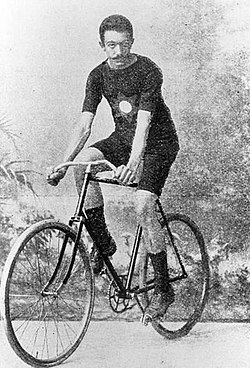| Road race at the Olympic Games | |
|---|---|
 The first road race winner, Aristidis Konstantinidis, in 1896 | |
| Overview | |
| Sport | Cycling |
| Gender | Men and women |
| Years held | Men: 1896, 1936–2024 Women: 1984–2024 |
| Reigning champion | |
| Men | |
| Women | |
The road race is one of two road bicycle racing events held at the Summer Olympics, the other being the time trial. The road race is a mass start, distinguished from the separate starts of the time trial. The men's road race was first held at the 1896, was not held again for 40 years, then has been held every Summer Games since the 1936 Summer Olympics. The women's event was first contested at the 1984 Summer Olympics, being the first women's cycling event (track events were added in 1988).
Contents
A team event, with the results of the individual event being used to place the teams, was held from 1936 to 1956 (4 times).